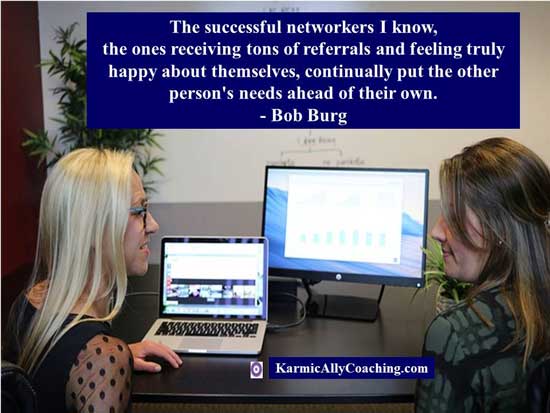This post has already been read 385 times!

Networking, whether for business or career goals, isn’t rocket science. It’s a skill you really need to develop.
Used appropriately, it will enable you to achieve your goals while facilitating others to achieve theirs. And yet, we often get it all wrong!
Take LinkedIn for example. It’s a great place to expand one’s online network and provide space for new career moves and business opportunities.
Yet I find many professionals use it more to build a database of people rather than actually nurture and keep in touch with their existing network.
You know, like the guy or gal who goes to a networking event and hands out their business card to everyone but doesn’t stop to actually start a conversation.
It baffles me as to why anyone would want to connect with strangers to further their career goals when an existing network that knows them would be better suited for assistance.
In my post How to make your One-on-One Networking effective blog post, I referred to a highly experienced professional who was reluctant to approach his existing network for help in finding a job, The resistance came from his having been out of touch with his contacts.
One of those contacts was in talent management services and was the right person to approach for help. Instead, he wanted to try out other professionals before turning to his existing network that he had not been in touch with.
I can understand that reluctance but there is a way to reach out to valuable cold contacts.
But why not first reach out to people who can make an immediate difference in moving the needle towards our goals first?
Your workplace is ALSO a place to network.
There’s another venue where we can use our networking to boost our job satisfaction and advance our career – our workplace. This gets ignored because it is in front of us, but we don’t consider it to be networking.
I’m talking about the colleagues who work by your side each day. These are people who can provide some of your best opportunities for developing close friendships and gathering constructive feedback.
Take it a step further and develop connections with colleagues in different departments that you might have to deal with in the course of your job.
While lateral transfers and new openings might be advertised in your company’s intranet, these are the people who can tell you more about opportunities that you might find interesting.
They’re the ones who can also tell you more about their department and provide information giving you the edge over others who might be applying for the same position.
It’s called Internal Networking and it’s easy. In fact, so easy that done right, you wouldn’t even realize you’re networking!
One easy tip is to take advantage of lunchtime and join colleagues both from your department and others in the office canteen for informal conversations.
You can get tips on how to make this work in my post about Networkers who Lunch and the book Never Eat Alone by Keith Ferrazzi.
I’ve got 7 more that work well for everyday situations and help you develop the skill of social intelligence as a bonus.
Internal Networking for Everyday Work
One thing you’ll notice with the below tips is that they also help you to demonstrate emotional intelligence which is a much-required skill and trait IF you are aiming at a leadership position.
- Be helpful. Being generous will help you develop strong relationships around the office. Volunteer your services when a colleague is trying to meet a tight deadline. Share your expertise on how to close a sale.
- Take initiative. Cultivate a reputation for going the extra mile. Earn trust by being a top performer.
- Speak up. Conflicts rarely resolve themselves. Talk issues over promptly and tactfully before they grow into more serious clashes that can undermine goodwill.
- Communicate face to face. While it’s quicker to text or send an email, face-to-face discussions have many advantages. Let others know you value them enough to spend time with them. A personal touch increases engagement.
- Listen closely. Give others your full attention. They’ll appreciate your interest, and you’ll learn more about them. That knowledge will help you ask relevant questions and avoid misunderstandings.
- Share a laugh. Lighten up. A joke or funny comment can relieve stress and make your boss look forward to having you drop by.
- Show you care. Simple gestures can show your coworkers that they matter to you. Remember their children’s names. Tell them that you hope they’re feeling better when they return from a sick day.

But internal networking isn’t just for daily interactions. It can advance your career and position you as a people’s person and leadership when you demonstrate this skill on the one-off occasions or those that role around a few times during the year.
Internal Networking for those One-off Occasions
- Mingle at office parties. Maybe you have a position where your interactions are limited to the same few people each day. Use birthday parties and summer picnics to extend your circle. Chat with a peer in another department.
- Bond at retreats. Corporate retreats provide an opportunity for profound discussion and silly games. See your coworkers from a new angle.
- Participate in staff meetings. Staff meetings will fly by more quickly when you take an active part in the proceedings. Thank the accounting department for explaining the new timesheets. Share what you learned at a business roundtable.
- Ace your orientation. If you’re new on the job, ask your supervisor to point out a stellar employee you can emulate. Make them a top priority for your internal networking.
- Welcome new hires. If you’ve been on the team for a while, go out of your way to welcome the newcomers. Your extra efforts will stand out when they’re trying to memorize a ton of new names and faces. Plus, teaching is a great way of learning, so you may pick up a few pointers as you guide them around.
- Transition gracefully. While you’ll probably move on to another organization eventually, your last days can be a productive period when you adapt your relationships to changing circumstances. Exchange contact information and make specific plans to stay in touch instead of counting on having lunch someday.
In other words, there’s much more to networking than handing out business cards.
Connecting with colleagues inside your company can be just as important as participating in any trade show or creating a database of contacts on social media platforms.
Building genuine relationships with your office co-workers will strengthen your network and make your work more meaningful because you will have the support to do your best.




 I adhere to the Certified Coaches Alliance Code of Ethics and Standards. A copy is available on request.
I adhere to the Certified Coaches Alliance Code of Ethics and Standards. A copy is available on request.
 Let's Talk through the Connect Form:
Let's Talk through the Connect Form: